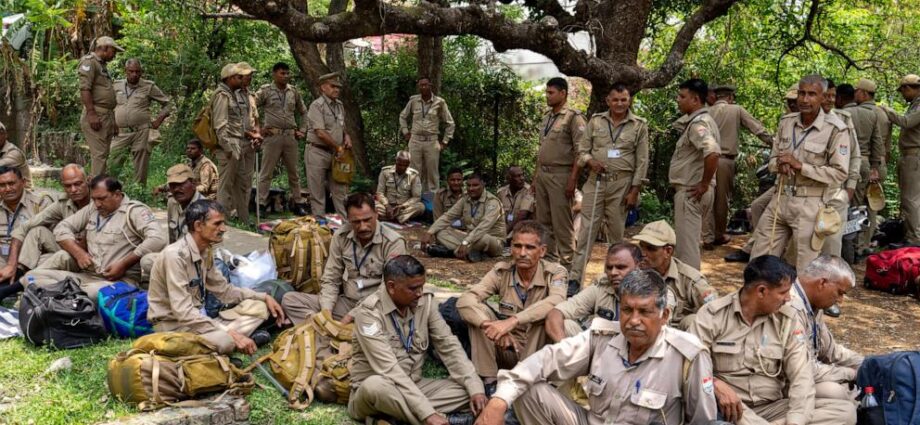Varanasi: Indians Flock to the Polls Under Scorching Heat in the Hindu Holy City
Varanasi: Indians Flock to the Polls Under Scorching Heat in the Hindu Holy City
Indians flocked to the polls under scorching heat in the Hindu holy city of Varanasi on Saturday as a marathon national election reached its final day, six weeks after the voting began.
Indian Prime Minister Narendra Modi is widely expected to win a third term in office when results are announced Tuesday, largely due to his cultivated image as an aggressive champion of India’s majority faith.
The 73-year-old’s constituency of Varanasi is the spiritual capital of Hinduism, where devotees from around India come to cremate deceased loved ones by the Ganges river.
Introduction to Varanasi and the National Election
Varanasi, often regarded as the spiritual heart of Hinduism, has been a focal point in India’s national elections. As voters braved extreme heat, the city represented the conclusion of a six-week voting marathon and mirrored the nation’s intense political and cultural dynamics.
Modi’s Stronghold: Varanasi’s Significance
Modi’s Popularity in Varanasi
Modi’s association with Varanasi has strengthened his political image. The city’s residents hold a deep sense of pride in his leadership. Vijayendra Kumar Singh, a local hotel worker, expressed the general sentiment, stating, “Modi is winning. There’s a sense of pride with everything he does, and that’s why people vote for him.”
A Legacy of Two Landslide Victories
Modi has previously led the Bharatiya Janata Party (BJP) to two significant victories in 2014 and 2019. His appeal to the Hindu majority has been a cornerstone of his political strategy, consolidating his support base.
Religious Symbolism in Modi’s Campaign
Inauguration of the Temple
One of Modi’s notable achievements this year was presiding over the inauguration of a grand temple dedicated to the deity Ram. In 1992, Hindu zealots destroyed a centuries-old mosque in Ayodhya, which served as the foundation for this temple. The temple’s construction was a long-standing demand of Hindu activists and was celebrated nationwide.
Impact on the Muslim Community
While many people have praised Modi’s actions, they have also caused unease among India’s sizable Muslim minority. His rhetoric and policies have often been perceived as divisive, contributing to a sense of insecurity within the Muslim community.
The Grueling Election Process
Seven Phases Over Six Weeks
India’s election process is a logistical marvel, conducted in seven phases over six weeks to accommodate the vast population. Varanasi’s voters faced the added challenge of extreme heat, with temperatures reaching up to 44 °C (111 °F).
Heatwave’s Impact on Turnout
The intense heatwave has affected Varanasi and northern India, contributing to a lower voter turnout compared to the previous election in 2019. Climate change has exacerbated these conditions, making heatwaves more frequent and severe.
Modi’s Unchallenged Path to Victory
Opposition’s Lack of a Unified Front
Analysts have consistently predicted a Modi victory, partly because the opposition has failed to present a unified candidate. Various criminal probes into opposition leaders and financial investigations have weakened their position.
Western Democracies and India’s Global Position
Western democracies have avoided mainly criticizing Modi’s human rights record, focusing instead on cultivating a strategic partnership with India. Modi’s tenure has seen India’s diplomatic and economic stature rise, adding to his domestic support.
Public Sentiment in Varanasi
Support from Voters
Many voters in Varanasi admire Modi’s achievements. Shikha Aggarwal, a 40-year-old voter, shared, “As an Indian, I feel that he has ensured a lot of respect and prestige for India during his term. People now look at India and Indians with a lot more respect.”
Challenges on the Ground
Despite the support, the extreme weather conditions posed significant challenges. Chinta Devi, who voted early in the morning, noted, “It’s already so hot. Varanasi has felt hotter than usual over the last few days. You see all the streets and markets empty.”
Conclusion
The national election in Varanasi is more than just a political event; it reflects India’s complex interplay of religion, politics, and climate challenges. As Modi is poised for a third term, the city is a testament to his enduring influence and the evolving landscape of Indian democracy.
FAQs
1. Why is Varanasi significant in Indian politics? Varanasi is the spiritual capital of Hinduism and the constituency of Prime Minister Narendra Modi, making it a focal point in Indian politics.
2. How has the heatwave affected the election turnout? The extreme heatwave has contributed to a lower voter turnout, as many voters opted to stay indoors to avoid the scorching temperatures.
3. What is the significance of the temple in Modi’s campaign? The inauguration of the Ram Temple fulfilled a long-standing demand of Hindu activists and has been a critical element in Modi’s appeal to the Hindu majority.
4. How has Modi’s tenure impacted India’s global position? Modi’s tenure has seen India’s diplomatic and economic stature rise, and it has become the world’s fifth-largest economy.
5. How many challenges does India’s Muslim community face under Modi’s leadership? Many in the Muslim community feel uneasy about their future due to Modi’s divisive rhetoric and policies, which have often been perceived as favoring the Hindu majority.
Source link
2024-06-01 05:37:31
Politics, Religion and politics, Hinduism, Referendums, Voting, Elections, World news, General news










